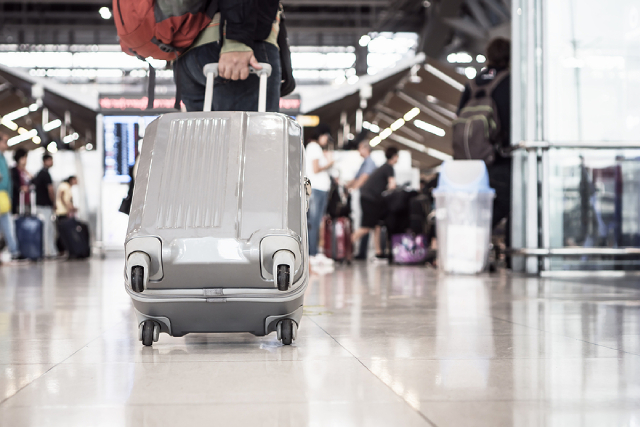
Travelling is a rewarding experience, offering the chance to explore new places, cultures, and cuisines. However, for those living with chronic conditions, planning a trip can come with additional challenges.
Whether you have diabetes, arthritis, heart disease, or another long-term health issue, travelling doesn’t have to be off-limits. With careful preparation and mindful planning, you can enjoy your journey safely and comfortably. Here are some practical tips to help you travel with a chronic condition.
1. Consult your healthcare provider
Before embarking on any trip, it’s crucial to discuss your plans with your healthcare provider. They can offer personalised advice based on your condition and the specifics of your travel itinerary. Some questions to consider include:
- Are there any travel restrictions or activities to avoid?
- How should you manage your medication schedule across different time zones?
- Do you need any vaccinations or preventive measures for your destination?
Ensure you have an up-to-date health check-up and obtain a letter from your doctor detailing your condition, treatment plan, and any necessary prescriptions. This documentation can be invaluable in case of an emergency.
2. Plan ahead for medication
Medication management is a critical aspect of travelling with a chronic condition. Here are some steps to ensure you have everything you need:
- Carry extra supplies: Pack more medication than you think you’ll need in case of delays or unexpected extensions to your trip. A general rule is to bring at least a week’s worth of extra medication.
- Use a pill organiser: This can help keep your medication schedule organised and ensure you don’t miss any doses.
- Pack medications in your carry-on: Always keep your medication in your carry-on bag to avoid the risk of losing it with checked luggage. Make sure all medications are in their original containers with clear labels.
- Check storage requirements: Some medications need to be kept at specific temperatures. Consider how you will store these medications during your trip, such as using insulated bags or portable coolers.
3. Research your destination
Understanding your destination’s healthcare infrastructure is essential. Research local medical facilities and the availability of your medications. It’s also beneficial to know how to access emergency services. The following tips can help:
- Identify nearby hospitals and pharmacies: Note their locations and operating hours.
- Learn key phrases: If travelling to a country where a different language is spoken, learn essential phrases related to your condition and medication needs.
- Understand Local Healthcare Practices: Some countries may have different medical practices or availability of treatments. Knowing this in advance can help you prepare accordingly.
If the situation is dire or if medical capabilities in the area are insufficient, it is recommended that you call for an air ambulance.
4. Prepare for the journey
Long flights or car rides can be particularly challenging for those with chronic conditions. Here are some strategies to make your journey more comfortable:
- Stay hydrated: Drink plenty of water to avoid dehydration, which can exacerbate many chronic conditions.
- Move regularly: If possible, get up and stretch or walk around every hour to improve circulation and prevent stiffness.
- Pack healthy snacks: Bring snacks that meet your dietary requirements to avoid relying on limited or unhealthy food options while travelling.
5. Manage stress and fatigue
Travel can be exhausting and stressful, which can trigger flare-ups or exacerbate symptoms. To manage stress and fatigue:
- Pace yourself: Don’t over-schedule your itinerary. Allow time for rest and relaxation each day.
- Practice stress-relief techniques: Techniques such as deep breathing, meditation, or gentle stretching can help manage stress.
- Get adequate sleep: Ensure you have a comfortable sleeping arrangement and try to maintain a regular sleep schedule, even in different time zones.
6. Pack smart
Packing appropriately can make a significant difference in your comfort and health management while travelling:
- Bring comfortable clothing: Pack loose, comfortable clothing and supportive footwear, especially if you have mobility issues or joint pain.
- Include a first-aid kit: A small kit with bandages, antiseptics, pain relievers, and other essentials can be handy for minor health issues.
- Carry medical ID: Wear a medical ID bracelet or carry a card that lists your chronic condition, medications, and emergency contacts.
7. Travel insurance
Investing in comprehensive travel insurance is vital for travellers with chronic conditions. Ensure your policy covers pre-existing conditions, medical emergencies, and trip cancellations related to health issues. Read the fine print and, if necessary, consult with the insurance provider to confirm that your specific needs are covered.
8. Accessibility considerations
If you have mobility issues or require special accommodations, research your options in advance:
- Check accessibility: Ensure your accommodation, transportation, and attractions are accessible and can meet your needs. Look for hotels with elevators, ramps, and accessible bathrooms.
- Request assistance: Most airlines and transportation services offer assistance for travellers with disabilities. Request any needed services well in advance.
9. Stay connected
Staying connected with friends, family, and your healthcare provider can provide peace of mind:
- Keep in touch: Regularly update a trusted person on your whereabouts and condition.
- Use technology: Utilise apps and devices to monitor your health. Many apps can help you track medication schedules, blood pressure, blood sugar levels, and other vital health metrics.
10. Be flexible
Despite careful planning, unexpected situations can arise. Be flexible and prepared to adjust your plans as needed. Listen to your body and prioritise your health above all else. If you need to rest or seek medical attention, do so without hesitation.
Conclusion
Travelling with a chronic condition requires extra planning and precautions, but it is entirely possible to have a safe and enjoyable trip. By consulting with your healthcare provider, managing your medication, researching your destination, and taking care of yourself during the journey, you can explore new places and create wonderful memories. Remember, the key to a successful trip lies in preparation, flexibility, and self-care.
In case of emergency, contact EMA Global: we offer medical evacuation in Singapore and beyond. Browse our website or reach out to us for more information.

